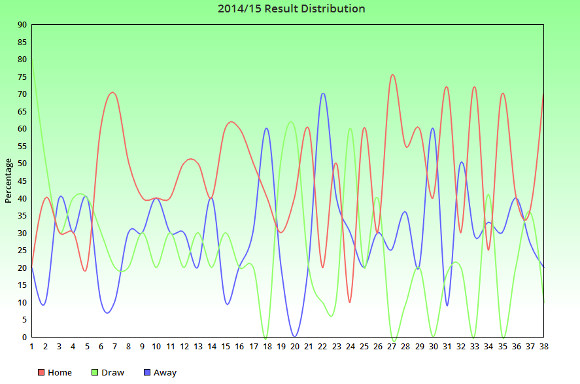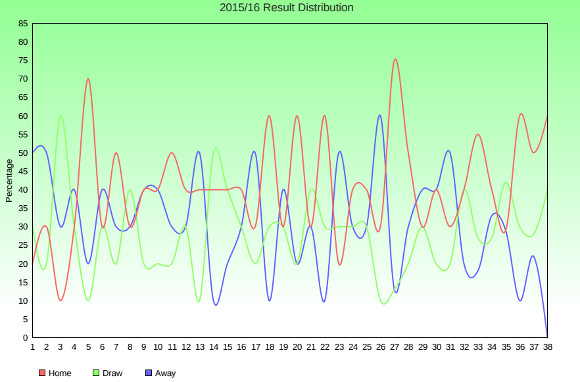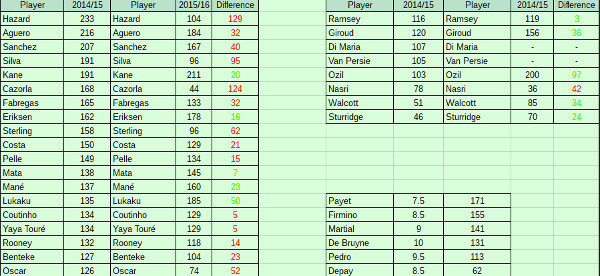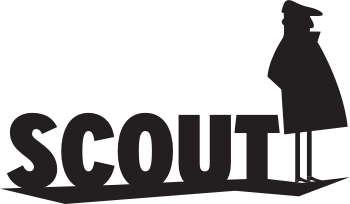For many Fantasy managers 2015/16 was a strange season, full of inconsistencies and upsets on a weekly basis. The argument of “form versus fixtures” raised its head throughout the year but at times the debate seemed futile. Some players that were in great form went missing for a run of games, only to return to form despite poor underlying statistics or fixtures. For this reason I think it is good to look at the various components that made this season so different to previous ones, and try to understand the context in which it unfolded.
Chips
This season saw the Fantasy Premier League introduce ‘Chips’. Fantasy managers could opt for All Out Attack, Bench Boost and Triple Captain Chips for one Gameweek each during the season.
At first their inclusion was met with mixed opinion and even now at the end of the season not much has changed. Personally, I was excited to see what I thought would be a more challenging element of the game, but by the end of May I felt the Chips were a bit of a distraction and a nuisance.
They ended up dictating how Fantasy managers approached double Gameweeks and their use of the second Wildcard. This, in my opinion, took some of the fun out of the game. I think Chips that are more specific to our teams would be a better addition by making managers take a risk, or at least present us with more choice as to when to use them rather than uniformly dispatching them around double Gameweeks.
Under-Performances
Many well-known managers, players and clubs fell short of expectation both in reality and in Fantasy terms. While this happens most years, the extent to which it happened this year was more noticeable (as we will look at further on).
Chelsea, last season’s champions, fell from grace early on as they struggled to climb from the relegation zone even up until Christmas. As a result, boss Jose Mourinho was sacked and Guus Hiddink took over as Chelsea went on to finish 10th.
Many believed Everton would have a superb season given their lack of European football, and we couldn’t have been farther from the truth. Roberto Martinez’ side had a horrible season, with easily one of the worst defences and the most inconsistent attacking options in Ross Barkley and Romelu Lukaku. The Toffees manager found himself leaving the club before their final home game victory that left them in 11th place.
Elsewhere in Merseyside, Jurgen Klopp came in for the sacked Brendan Rodgers and had a big task at hand. An eighth place finish was still disappointing, but he did add two finals to the club’s history, despite falling short of expectations in both.
Clubs that trailed off in the New Year included Arsenal and Crystal Palace. Arsenal seem to have a habit of this, with plenty of fans airing their frustration at manager Arsene Wenger. Alan Pardew’s Crystal Palace were sitting in sixth place after Christmas, and ended up 15th by May. Leicester and Claudio Ranieri wrote history as they made their league-winning fairytale a reality when they pipped Spurs in the title-race. Southampton and West Ham surprised a lot of people with a sixth and seventh place finish respectively.
Home Win Percentage
Linked to under performance is the home-win percentage. The two tables below show the results breakdown in the 2014/15 season and the current season. As we can see, the 2015/16 season is quite chaotic (inconsistent) with its harsh spiking on “home”, “draw” and “away” games whereas the 2014/15 graph is a little softer (consistent).
“Draws” were a lot more common this season in comparison to last year, while the average home games won per Gameweek is a lot lower compared to last season. In order for things to go back to ‘normal’, average home win percentage will need to improve.
2014/15

2015/16

Players and Consistency
Predicting what players to get was very hard early on, with many cautious about Leicester’s Riyad Mahrez and Jamie Vardy in case they turned out to be just another flash in the pan.
By the time many of us realised they were the real deal, Leicester were aiming for the title and their playing style began to change severely to a defensive one. Likewise for other cheap players that emerged like Christian Fuchs, Dele Alli, Jermain Defoe and Odion Ighalo.
I think many Fantasy managers (myself included) were stubborn in our decision to bring in these value players too late, and continued blindly with premium players such as Eden Hazard, Alexis Sanchez and Sergio Aguero through their dry spells in hope that they would improve.
There was a blatant inconsistency in a lot of players throughout the campaign. This can be seen by the table below, which compares the premium players’ points return of this season against last season. We can see that many of the top players dropped off massively with only a handful improving or getting close to last year’s returns.

Of the newly added mid-premium players it turned out Dimitri Payet was the standout pick at a starting price of 7.5. While the likes of Roberto Firmino and Kevin De Bruyne did deliver at times, overall they remained too inconsistent throughout the season to be considered as valuable premium options.
Value Over Replacement Player (VORP)
In recent years, a lot of competitive Fantasy managers have used this concept to better their teams and maximise the usefulness of their budget. For example, a 13.0 Aguero might score 10 points and a 5.0 Ighalo could score five points. Even though Aguero has scored five more points, we need to consider how much the 8.0 cash in price difference could have made an impact elsewhere, i.e. in defence or midfield.
In previous seasons, VORP was a very useful tool for squad management, but this year it was completely nullified for large parts of the season. With the cheap players such as Mahrez, Alli, Deeney and Ighalo in so many teams, the abundance of cash in Fantasy managers’ bank accounts made the concept of VORP useless. The lack of successful premium options for much of the season meant a Fantasy manager could literally have all of the in-form players without worrying about not being able to afford them: an element of the game that essentially separates the men from the boys in my opinion. Next season I expect (hope) that this will change.
*Thanks to Konig Luther and Berbinho for linking me up to the various stat pages I was looking for.





7 years, 11 months agoThanks so much for this. Really nails down exactly why this season was so different. while the chips were a key change, I think most savvy managers worked out how to use them pretty swiftly. Kavali's recent article on the FPL veterans, which shows this was their best season yet, shows that experienced fantasy managers adapt very quickly to rule changes.
The key changes that really tripped people up though was that incredible value in good players, the poor value in premium picks and as you point out the poor home form and unpredictability of results.
Next season I anticipate more Fantasy managers who played this year to understand the chips better and use them around double Gameweeks. That will make it trickier.
But what hopefully will make it easier will be a new 'normal' where premium players in top teams perform well at home - exactly when we want them to.